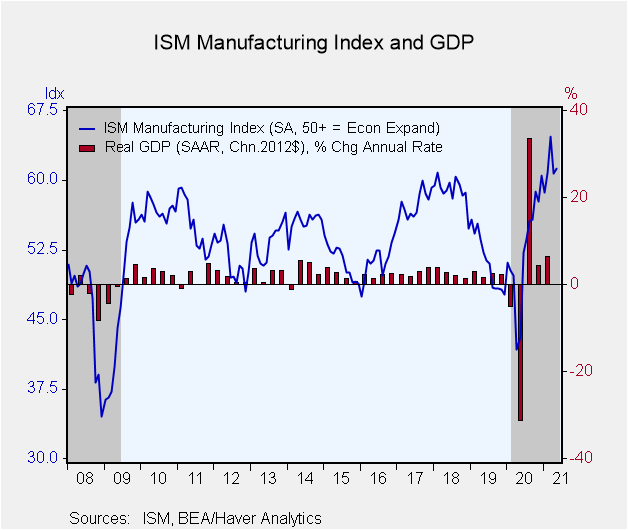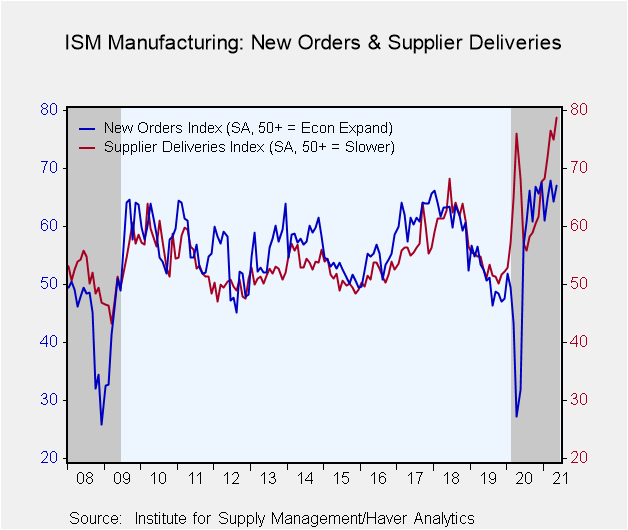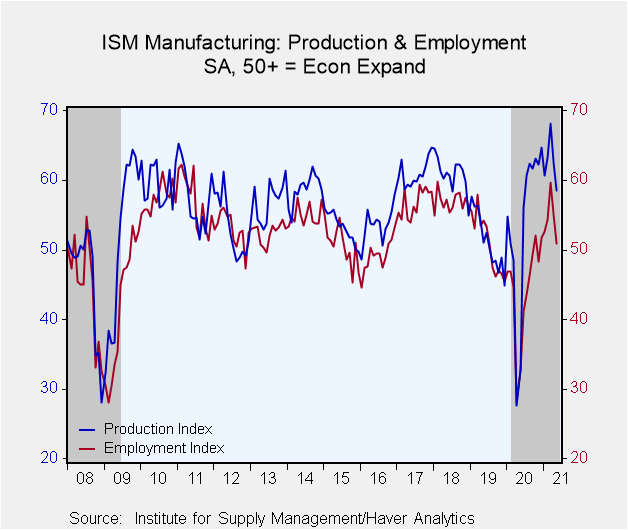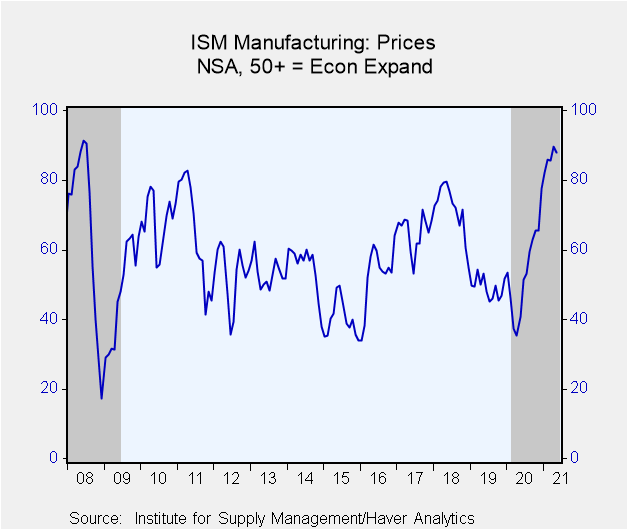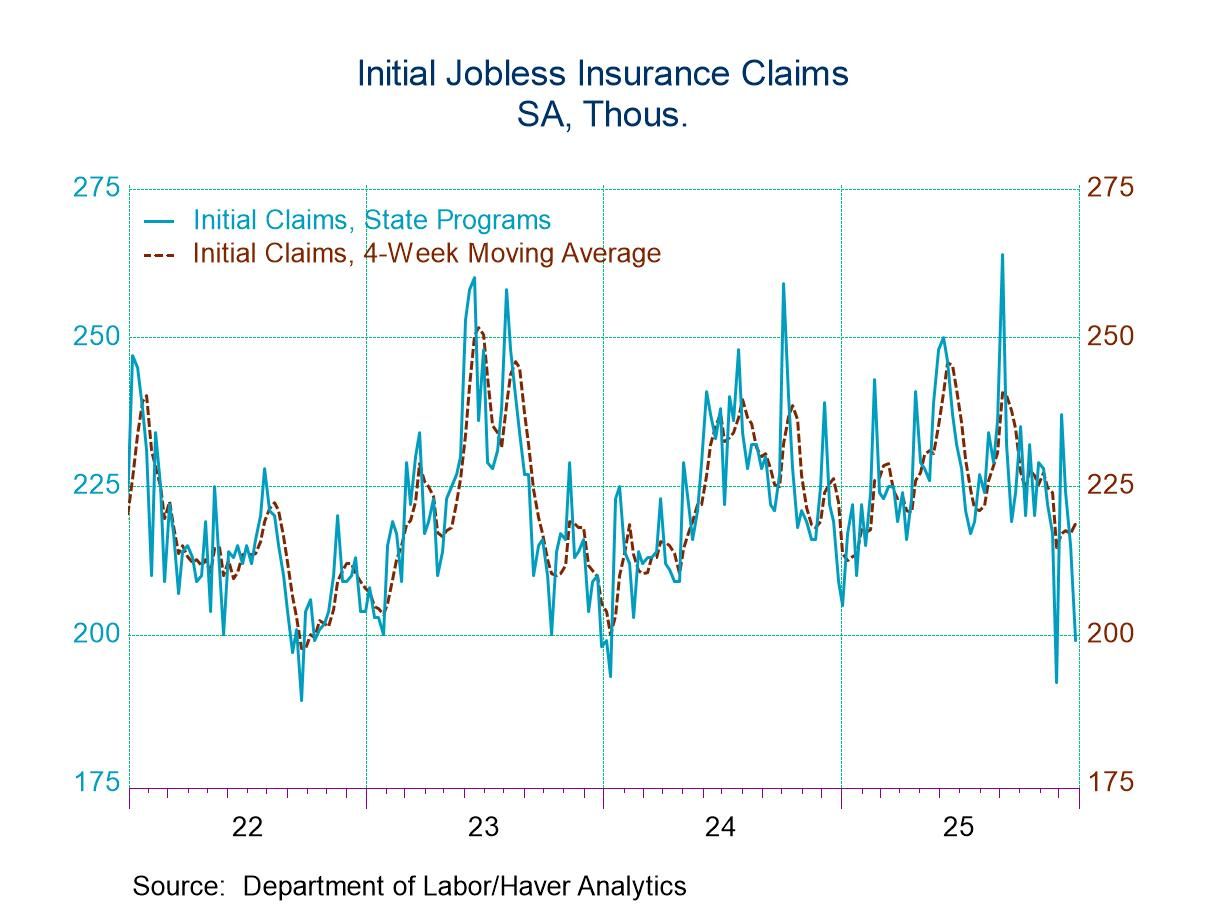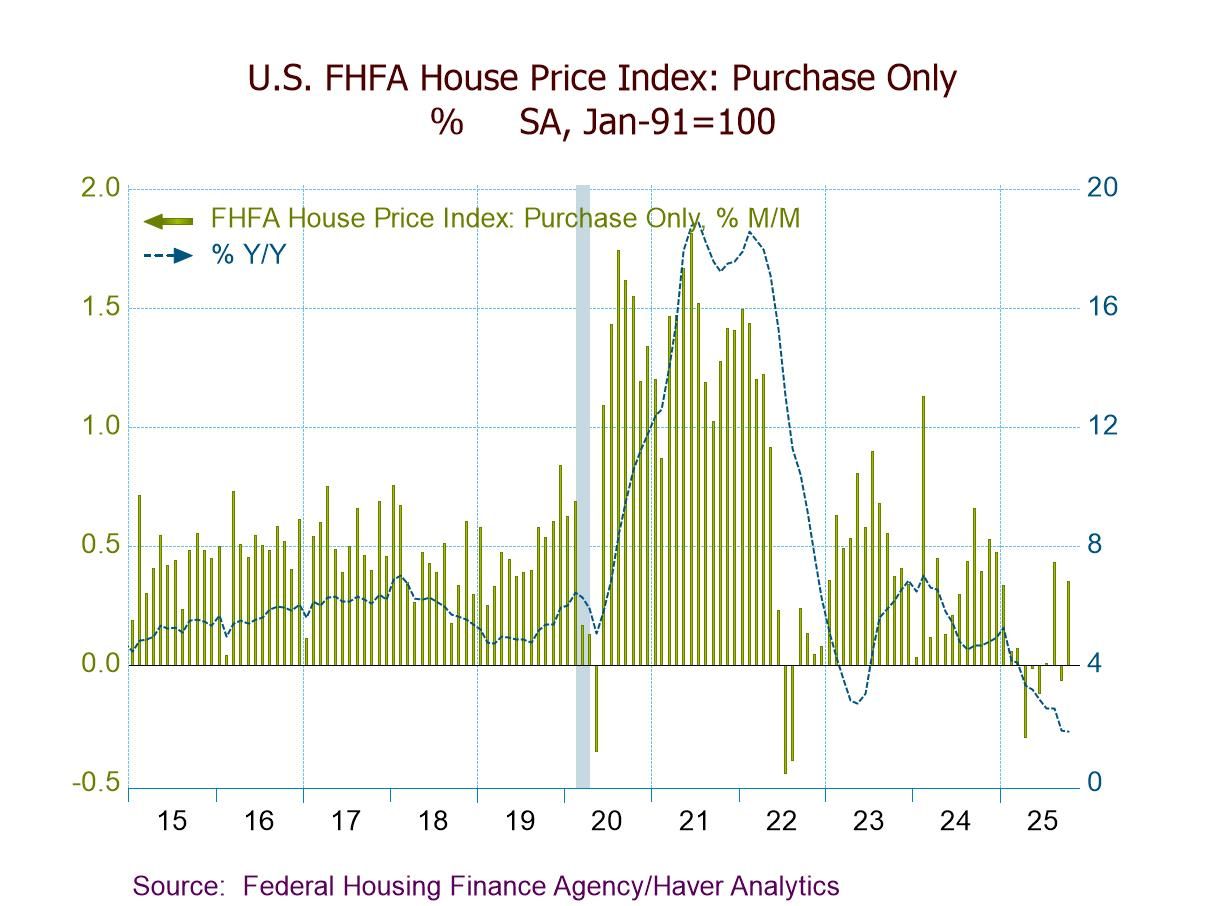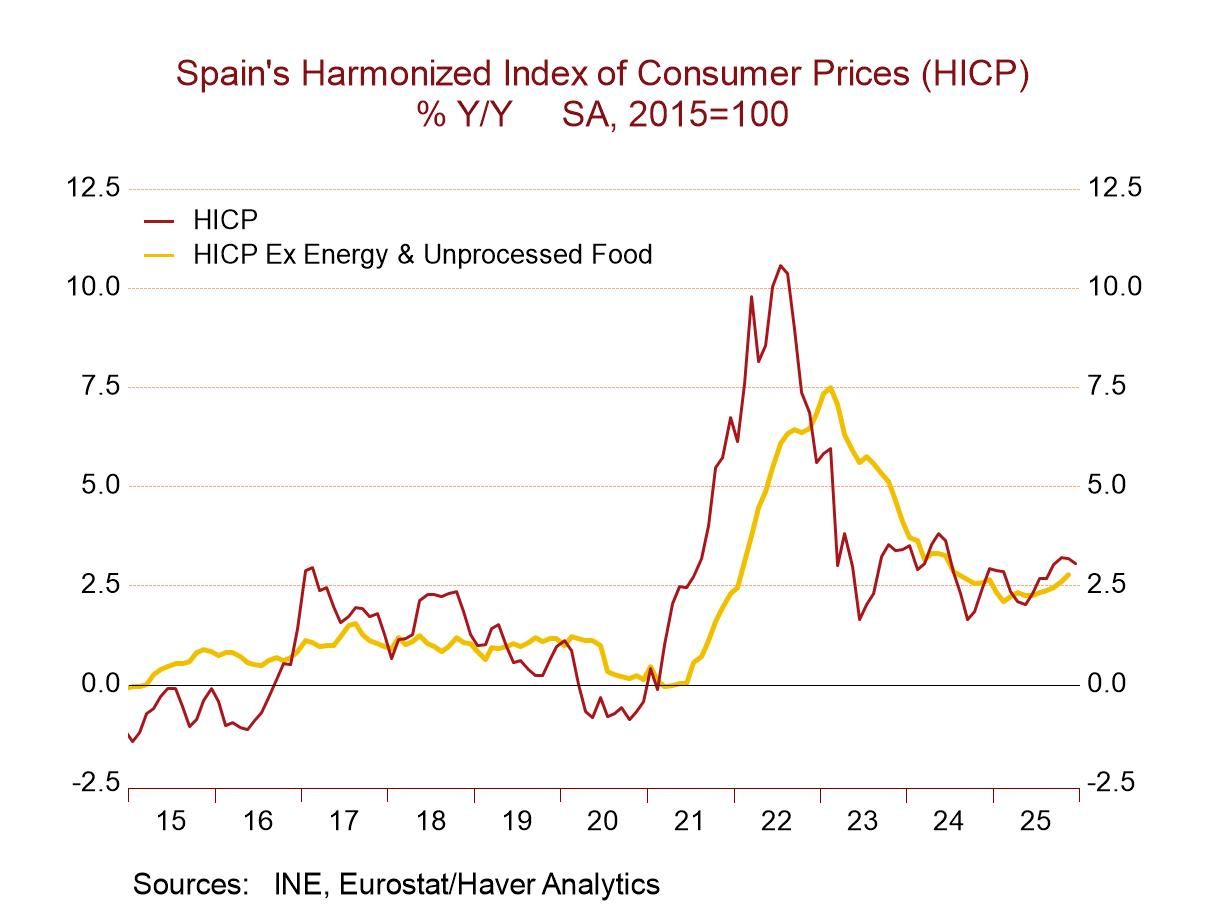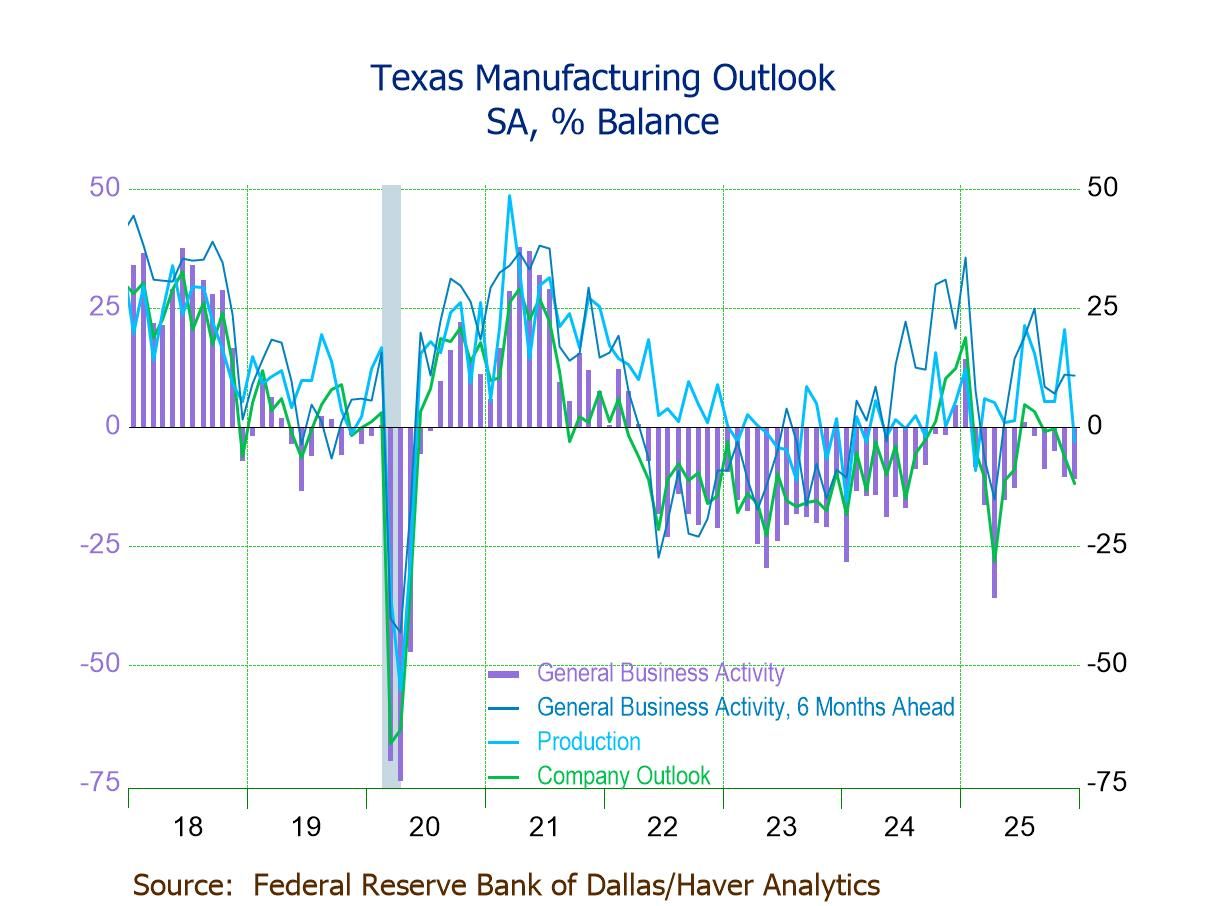 Global| Jun 01 2021
Global| Jun 01 2021ISM Manufacturing Index Continues to Indicate Growth in May
by:Tom Moeller
|in:Economy in Brief
Summary
• Factory activity expands for 12th consecutive month. • Component movement is mixed. • Pricing power remains strong. The Institute for Supply Management (ISM) reported that its Composite Index of Manufacturing Sector Activity [...]
• Factory activity expands for 12th consecutive month.
• Component movement is mixed.
• Pricing power remains strong.
The Institute for Supply Management (ISM) reported that its Composite Index of Manufacturing Sector Activity increased to 61.2 during May following a sharp April decline to 60.7. A reading of 60.5 had been expected in the Action Economics Forecast Survey. During the last 15 years, there has been a 42% correlation between the composite index and the quarterly change in real GDP. Before the recession began, there had been a 67% correlation.
A higher new orders reading led last month's improvement with a rise to 67.0 after falling to 64.3 in April. The figure has moved erratically sideways for nine months. The supplier deliveries reading rose to 78.8 from 75.0. It indicated the slowest product delivery speeds since April 1974. The inventories index rose to 50.8 and reversed its April decline. Working lower was the production index to 58.5 from 62.5. It was the lowest level since June of last year as supply bottlenecks intensified.
The employment index fell to 50.9 during May from 55.1 in April and brought the reading to the lowest level in six months. A lessened 20.8% (NSA) of respondents reported more hiring, down from 21.2% in April, while a greatly increased 18.0% reported fewer jobs, up from 10.9% in April.
The prices index eased to 88.0 from 89.6 in April, but it remained near the highest point since July 2008. A slightly lessened 77.1% of respondents reported higher prices while just 1.2% reported them lower.
Amongst other ISM series not included in the composite, the order backlog figure rose to 70.6 (NSA), up from 38.2 twelve months earlier. It was a record high for this measure which dates back to January 1993. The new export measure rose slightly to 55.4 from 54.9. The figure was down from a November high of 57.8.
The ISM figures are based on responses from over 400 manufacturing purchasing executives from 20 industries, which correspond to their contribution to GDP in 50 states. These data are diffusion indexes where a reading above 50 indicates expansion. The figures from the Institute for Supply Management can be found in Haver's USECON database; further detail is found in the SURVEYS database. The expectations number is available in Haver's AS1REPNA database.
| ISM Mfg (SA) | May | Apr | Mar | May'20 | 2020 | 2019 | 2018 |
|---|---|---|---|---|---|---|---|
| Composite Index | 61.2 | 60.7 | 64.7 | 43.1 | 52.5 | 51.2 | 58.9 |
| New Orders | 67.0 | 64.3 | 68.0 | 31.9 | 54.0 | 51.2 | 61.6 |
| Production | 58.5 | 62.5 | 68.1 | 32.8 | 53.8 | 51.3 | 60.9 |
| Employment | 50.9 | 55.1 | 59.6 | 32.8 | 44.3 | 50.9 | 56.9 |
| Supplier Deliveries | 78.8 | 75.0 | 76.6 | 68.1 | 61.6 | 52.9 | 62.0 |
| Inventories | 50.8 | 46.5 | 50.8 | 50.1 | 48.8 | 49.9 | 52.9 |
| Prices Paid Index (NSA) | 88.0 | 89.6 | 85.6 | 40.8 | 54.0 | 49.1 | 71.7 |
Tom Moeller
AuthorMore in Author Profile »Prior to joining Haver Analytics in 2000, Mr. Moeller worked as the Economist at Chancellor Capital Management from 1985 to 1999. There, he developed comprehensive economic forecasts and interpreted economic data for equity and fixed income portfolio managers. Also at Chancellor, Mr. Moeller worked as an equity analyst and was responsible for researching and rating companies in the economically sensitive automobile and housing industries for investment in Chancellor’s equity portfolio. Prior to joining Chancellor, Mr. Moeller was an Economist at Citibank from 1979 to 1984. He also analyzed pricing behavior in the metals industry for the Council on Wage and Price Stability in Washington, D.C. In 1999, Mr. Moeller received the award for most accurate forecast from the Forecasters' Club of New York. From 1990 to 1992 he was President of the New York Association for Business Economists. Mr. Moeller earned an M.B.A. in Finance from Fordham University, where he graduated in 1987. He holds a Bachelor of Arts in Economics from George Washington University.


